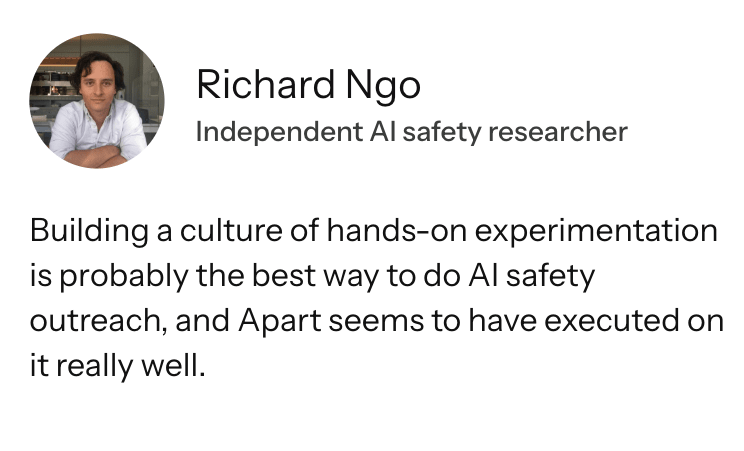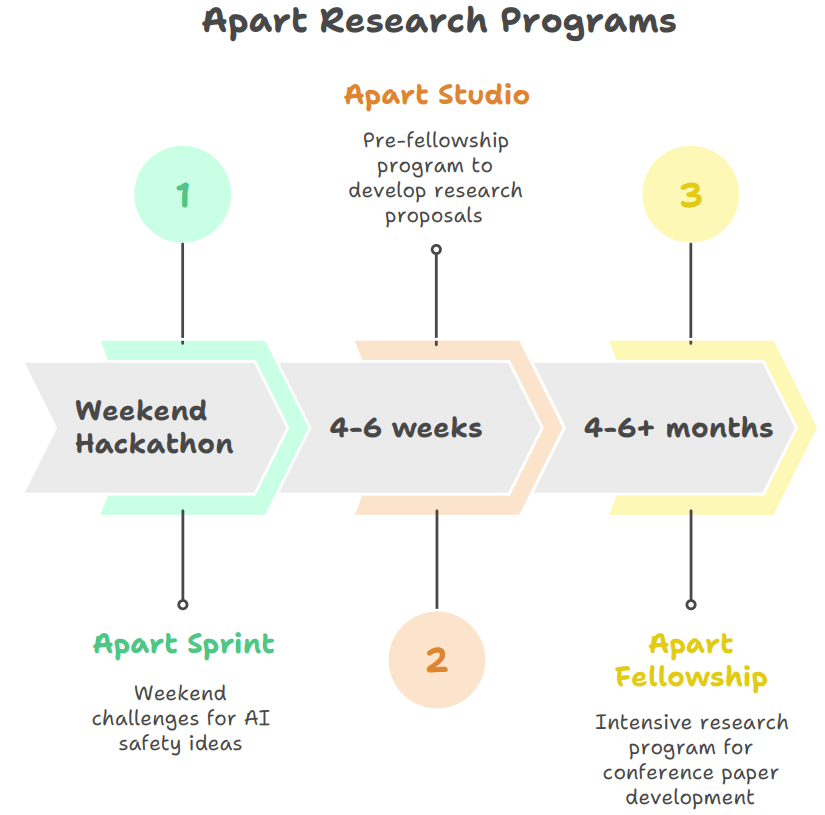TLDR:
- Apart Research incubates talent and research in AI Safety. We use high-volume weekend hackathons to filter for talent, then support them through the Studio and Fellowship programs.
- Track Record Highlights include placements at leading AIS orgs (e.g. METR, CAIF), alumni starting their own AIS orgs (e.g. Geodesic Resesarch, Asymmetric Security) and impactful research output, including an ICLR 2025 Oral (top 1.8%) on AIS Evals. Our work has also been used by Anthropic, UK AISI and the EU AI Office.
- We are currently operating at capacity. While our remote infrastructure is scalable with decreasing marginal costs, we cannot support the volume of qualified applicants without additional funding.
- Donations between $1k and $12,5k will enable us to support more top talent, produce more research and host additional global hackathons in AI Safety. Donations between $80k and $100k will enable us to make key hires for 2026.
What is Apart Research
Apart Research is a remote-first AI Safety organisation for field-building and research. We focus on converting technical talent into published AI safety researchers, ready to contribute to impactful organizations. We serve top talent globally, whether they're new to AI safety or looking to deepen their engagement.
We believe we can efficiently discover global AI safety talent by combining accessible entry with rigorous output-based filtering. Weekend hackathons let experienced technical talent from anywhere demonstrate capability without disrupting their careers. Then, structured research development programs (Studio → Fellowship) provide escalating support to those who demonstrate the fit through their research outputs.
How Apart Research creates impact
Apart Research identifies experienced technical talent globally through accessible weekend research hackathons, then provides structured research experience and mentorship through increasingly selective programs (Sprint(Hackathon) → Studio → Fellowship) that produce peer-reviewed publications preparing top participants for AI safety careers. Our alumni have published their research at top venues and transitioned to AI Safety roles, contributing technical diversity and research to the field.
What makes our approach distinctive:
- Accessible entry point: Weekend hackathons let globally distributed talent test fit without career disruption (substantially lowering the barrier compared to traditional fellowships requiring relocation or career breaks).
- Proven talent focus: We deliberately appeal to experienced talent from science (e.g. physics, biology, economics) and engineering to bring fresh perspectives and existing expertise.
- Outcome-based filtering: Rigorous selection based on research outputs at each stage from hackathon (48 hours) → studio (4/6 weeks) → fellowship (4/6 months) ensures quality and fit.
- Fast Track: Participants get research done as fast as they can. We remove idiosyncratic academic barriers supporting the participants to get the best research they can at their own pace.
- Rapid Response: Can launch research programs in emerging areas within weeks, even where expert mentorship is scarce.
- Research credentials: Publications at top venues provide the professional validation that enables career transitions into AI safety roles.
- Scalable Hackathons infrastructure: Remote-first model and scalable infrastructure enable global reach and cost-effective scaling.
Note on our filtering model: We have purposely designed a funnel with a wide entry and a narrow exit. We care more about efficiently allocating resources to the most promising talent and projects than pushing everyone through the whole pipeline. Off-boarding after a Sprint or Studio is a feature: Participants still gain research experience and legible outputs while we concentrate deeper support on those projects and participants with strongest fit and potential.
Apart's pipeline creates three types of value:
- Career transitions: We transform experienced technical talent into AI safety researchers placed at impactful organizations. Publications provide the professional credentials that enable these transitions. See section below “Our People: Case Studies from success stories in our programs”
- Research contributions: High-quality work that advances AI safety (incl. from participants who contribute valuable domain expertise but don't immediately transition into AI safety careers). See section below “Our Research”
- Ecosystem support: We enable AI safety organizations to explore research directions and identify talent without running their own fellowship programs. Partners can commission focused hackathons, fellowships, or both, on topics they care about. This allows them to see what ideas and talent emerge, and engage promising participants through mentorship with low overhead. Examples include: outsourcing the creation of hundreds of Tasks for METR (while identifying talent to hire), putting Goodfire's interpretability tools to the test, helping identifying global talent for Bluedot’s courses, contributing to a high-profile report on Multi-Agent Risks using the results from a hackathon co-organized with CAIF, and many more!
Track Record
Track Record (Inception – June 2025)

Last Summer we created an impact report summarizing the impact to date of Apart Research.
- TLDR In Numbers(updated as of Nov 2025):
- 5000+ participants across 45 hackathons
- 485 research reports submitted at our hackathons
- 45 Hackathon participants supported in the Studio since December '24 (Note:At the beginning, in 2023, we had only the Fellowship but in late 2024 introduced the Studio to increase efficiency of our pipeline)
- 105 fellows with 22 peer-reviewed publications
- 30 Placements at 20+ organizations
Our People: Case Studies from success stories in our programs
By prioritizing meritocratic project work over prior credentials, we have successfully accelerated students, software engineers, and seasoned professionals into high-impact roles in AI Safety. Some examples include:
- Founders and Research Leads: Cameron Tice founded Geodesic Research, focused on Chain-of-Thought (CoT) safety research, stating that his life changed the moment he applied for an Apart hackathon. Zainab Ali Majid leveraged the technical experience gained during her fellowship to pivot from digital forensics to founding Asymmetric Security, noting that 'all of my work in AI security traces back to my involvement with Apart.'
- Placements at Frontier Labs: Sami Jawhar joined the technical staff at METR largely due to an Apart hackathon project, while Prithvi Shahani utilized his portfolio to secure a position at Anthropic.
- Accelerating Career Transitions: Philip Quirke describes his experience at Apart as a 'transformation,' transitioning from an IT professional with zero AI experience to a safety Research Lead at Martian and RPM at FAR.AI, producing five papers and securing $90k in grants. Similarly, Luke Marks estimates the fellowship provided '1.5–2 years of counterfactual career progress,' accelerating his path to becoming a Research Fellow at Anthropic.
Please refer to this spreadsheet for the full list of best case studies, including detailed testimonials, specific career transition metrics, and more.
Note: We expect additional career transitions beyond those mentioned here among participants from our local sites. Although we previously tracked limited data on local hackathon participants, organizers from Paris, Georgia Tech, and other locations have reported multiple career transitions from our events. We are actively working to improve this tracking.
Our Research
Some of our Research Highlights include:
- Darkbench: A key result for Apart Research this year was publishing the Benchmark of Dark Patterns in LLMs at ICLR 2025. The paper received an Oral Award (top 1.8% of accepted papers), was featured in several news outlets, and presented at the inaugural IASEAl conference in Paris. This work led to our previous CEO, Esben Kran, being invited to provide technical assistance to the EU AI Office on Manipulation Evals.
- Rethinking CyberSecEval: This review and critique of cybersecurity evaluations from Meta's Llama models was delivered directly to Meta's internal team at a conference. The work helped establish the Apart Core team's expertise in the field, resulting in their invitation as panelists for the first evaluations workshop hosted by the EU AI Office.
- Sandbag Detection through Model Degradation has been used by Anthropic and UK AISI.
Please refer to this spreadsheet for more detailed stats on our research.
Recent Progress (June 2025 – Present)
Since our last impact report in June Apart Research has:
- Run 5 Hackathons with a steady increase in the number of participants and quality (for full details see here).
- Including the biggest AI Safety Hackathon to date, happening this weekend, in collaboration with Bluedot Impact, with:
- Over 1000+ participants
- Over $20k in prizes (from Sponsors like Halcyon Futures and BDI)
- 15 local groups running the hackathon in parallel in person. Including major hubs in London and San Francisco co-hosted by Bluedot Impact.
- 5+ speakers
- Official recognition as a Pre-Summit event for the AI India Summit
Research Highlights:
- 1 paper accepted to NeurIPS main conference (would have been 2, but for capacity issues).
- At least 2 NeurIPS main conference papers and 2 NeurIPS workshop papers from Apart alumni.
- 4 NeurIPS workshop papers from Apart teams, including a spotlight at the mech. interp. workshop, and 1 additional acceptance for a hackathon followup project (now in Fellowship).
- Submitted 2 papers to ICLR (in rebuttals) and 3 to IASEAI (rebuttals finished).
- 1 team secured 60,000 GBP from UK AISI research grants thanks to Apart's support.
- Applied to an EU Tender in evals to support an alumni team (results pending).
What we will be able to do with more funding
- Every ~$1k will allow us to support a participant in the Studio, where they can turn their hackathon idea into a research project proposal. In recent iterations, many proposals were published directly as workshop papers at NeurIPS. Your $1,000 donation provides core team support and unlocks over $1,000 in free computing resources from our partners.
- Every ~$5k enables us to assist a Fellowship participant in transforming their research project proposal into a conference paper. Your $5,000 donation secures core team support and provides over $5,000 in free computing resources from our partners.
- Every ~$12.5k in funding will launch a new AI Safety hackathon, offering 300+ people the opportunity to test empirical ideas and gain hands-on research experience with expert feedback. Beyond our infrastructure and support, each team receives $400 in free compute from our partners.
- ~$80k will fund dedicated communications support in 2026 to elevate Apart's voice by transforming our research into accessible content for key audiences. This hire will proactively announce research outputs, optimize outreach through engagement tracking, and ensure our participants' work reaches stakeholders who can amplify its impact.
- ~$90k will allow us to hire another Research Project Manager for the Studio and Fellowship for 2026. This will increase the cost-effectiveness of Studio and Fellowship participants and allow us to accept more talent from the hackathons. As the hackathons scale in quality and quantity, we want to accept more high-quality talent into the Studio and Fellowship.
- ~$100k will enable us to hire a Research Acceleration Engineer to accelerate the development and scaling of our AI safety research across all programs. This hire will collaborate with fellows and advisors to implement research prototypes, provide technical mentorship during hackathons, and help our community scale research operations through automated workflows.
Notes:
- The costs above represent averages based on our last cohorts for the Studio and Fellowship. We operate at capacity with approximately 4 full-time staff, but our remote infrastructure and established processes are already built and ready to scale.
- This means additional funding immediately improves cost-efficiency: the actual marginal cost to add participants to existing cohorts is significantly lower than these averages, and larger cohorts further reduce per-person costs by spreading fixed infrastructure expenses across more participants.
- This is especially true for hackathons, where we can accommodate 2-3x more participants with minimal additional investment.
- In short: as we receive more funding and grow our cohorts, your donation goes further, supporting more researchers at a lower effective cost per person.

